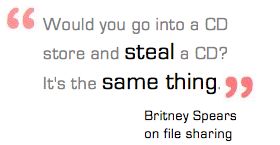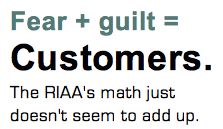Intimidating rhetoric
Intimidation is one of the main tacticts that copyright holders and their supporters use against file sharing users, and this is reflected in their rhetoric. File sharing users are often threatened with legal penalties—a portion of the Music United web page reads, “If you make unauthorized copies of copyrighted music recordings, you’re stealing. You’re breaking the law, and you could be held legally liable for thousands of dollars in damage” (Music United, n.p.). Besides these kinds of threats to the public in general, copyright holders have also targeted individual file sharing users by sending them instant messages alerting them that their actions are illegal as part of an “educational effort.” The actual messaged stated, among other things, that “When you break the law, you risk legal penalties... When you offer music on these systems, you are not anonymous and you can easily be identified.” (Figure 1)

Figure 1: The RIAA sent instant messages directly to thousands of file sharing users warning them that they could be easily found and prosecuted. Source: RIAA
Logical Fallacies
Although copyright holders clais that they are trying to educate people on file sharing and present arguments against using it to obtain copyrighted materials, their arguments suffer from logical fallacies. The intimidating rhetoric they use can be categorized as an "appeal to force"—it uses threats that are unrelated to the truth or falsity of the claim in order to argue that the claim is correct (The logical fallacies, 1996). Copyright holders can also be seen using false analagies when they attack the ethical integrity of users. |
|

Attacking ethical integrity
Copyright holders attack the ethical integrity of file sharing users by equating the act of downloading copyrighted files with stealing physical CDs. Copyright holders have the notion that most people find the act of going into a store and stealing a physical CD to be morally wrong to the degree that they would not do it, and try to use this to their advantage by claiming that downloading music is no different. In a print advertisement they ran called "Who really cares about illegal downloading?", Music United quoted country song writer Matraca Berg as saying "Most songwriters are not rich or famous. They are hardworking craftsmen who depend on royalties to provide for their children. Stealing music is stealing from their families" (Music United, n.p.). This quote portrays the issue in a way that makes it hard for people to take the opposing side—not many people would want to say that they agree with stealing money that would go to supporting families. However, comparing file sharing to stealing can be seen as a false analagy because many people think the two activities are sufficiently different that the analagy does not hold. For example, when one steals a physical CD, the owner of the CD is deprived of the object—the “thief” has gained something at another’s expense. However, when one uses file sharing services, they simply make a copy of the original object—no one actually “loses” anything. These differences are sufficient to show that the analogy that is often used is false, constituting a logical fallacy.
The Problem
Despite the strong rhetoric that copyright holders use to instill fear and guilt into file sharing users, file sharing is still rampant. It seems that file sharing users aren't convinced by the rhetoric and arguments that are provided against file sharing enough to stop their practice. The main reason is that the RIAA still hasn't gotten past one of the strongest methods moral justification that people use -- attribution of blame. Although they use bold language, emphasize that every person matters and that file sharing has real negative consequences for the industry, they haven't addressed the users's complaint that the music industry deserves what they're getting. If they want to stop users from file sharing, the music industry is going to have to use a lot more than rhetoric to do so.
|




